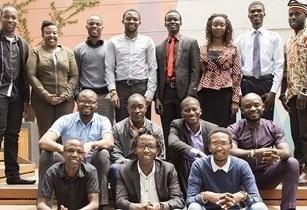Sixteen talented engineers selected from sub-Saharan Africa for innovations that improve quality of life and economic success, and overcome local, national and international challenges
2018 shortlist for the Royal Academy of Engineering Africa Prize for Engineering Innovation was announced today in Cape Town, South Africa. The shortlist recognises the most talented engineers from across sub-Saharan Africa, including innovators working to make malaria and reproductive health tests easier, using dolphin-inspired echo-location for visually impaired people, and recovering precious metals from car parts for re-use in manufacturing.
The Africa Prize was launched in 2014 by the Royal Academy of Engineering. The six-month programme provides a unique package of support, including funding, comprehensive business training, bespoke mentoring and access to the Royal Academy of Engineering’s network of high profile, experienced engineers and business development experts.
Each of the 16 engineers will develop skills that last a lifetime, and become part of a growing community of talented African engineers working to accelerate socio-economic development through business.
The shortlist, which represents the fourth group of engineers supported through the Africa Prize, also features several digital innovations. Among them are mobile apps that grant micro-loans within minutes, an app that makes it easy for musicians to manage bookings and sell merchandise, and another to help commuters book one of the 20,000 trips taken daily on motorcycle taxis in the city of Kigali, Rwanda.
Agricultural innovations also feature strongly. They include sensors that send soil information to farmers’ phones straight from the field, an online platform that helps farmers triple their yield, and a low-tech dehydrator that extends the shelf-life of crops tenfold, improving food security.
“Turning engineers into entrepreneurs is vital to unlocking the creative solutions that exist across Africa,” said Africa Prize judge, Moses Musaazi. “The Africa Prize’s support gives engineers the confidence to approach funders, clients and investors, and the knowledge to improve their supply chain and business models.”
The Africa Prize also recognises process engineering, represented this year by innovations to generate power from the many radio waves that are around us every day;and for producing affordable biogas from manure for household use.
Two educational solutions include an app that hosts a variety of courses and a mini science lab that fits into an ordinary school backpack.
A smart meter that allows customers to manage their utilities, and a solar-powered walk-in cold room complete the impressive shortlist.
“The Africa Prize recognises talented engineers from across the continent – supporting countries that aren’t typically seen as a source of innovation,” said Rebecca Enonchong, Africa Prize judge. “This diversity helps drive more innovation during the programme, amplifying their potential for real economic and social impact.”
After six months of mentoring and training, four finalists will be selected from the shortlist. In June 2018 the finalists will present their businesses to judges in front of a live audience, after which one winner will receive GBP£25,000, and three runners-up will be awarded GBP£10,000 each.





















